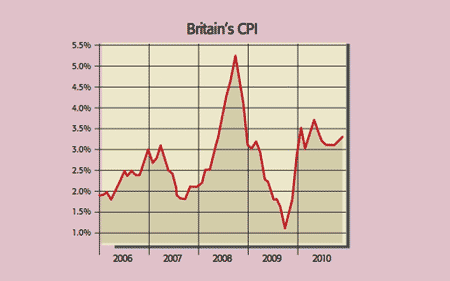Get the latest financial news, insights and expert analysis from our award-winning MoneyWeek team, to help you understand what really matters when it comes to your finances.
You are now subscribed
Your newsletter sign-up was successful
Want to add more newsletters?

Twice daily
MoneyWeek
Get the latest financial news, insights and expert analysis from our award-winning MoneyWeek team, to help you understand what really matters when it comes to your finances.

Four times a week
Look After My Bills
Sign up to our free money-saving newsletter, filled with the latest news and expert advice to help you find the best tips and deals for managing your bills. Start saving today!
There was growing concern this week that the Bank of England has got it wrong on inflation. The annual rate of consumer price inflation (CPI) unexpectedly climbed to 3.3% in November. The rise from 3.2% the previous month was due largely to food and clothing costs. CPI has now exceeded the Bank's 2% target for 40 of the past 49 months. The Bank said a year ago that it would be 1.7% at this stage. CPI is now likely to exceed 4% as VAT goes up in January and commodity prices are still rising. The labour market also deteriorated for the first time since the spring in the three months to October. Unemployment rose from 7.7% to 7.9%.
What the commentators said
We keep hearing from the bank that high inflation is temporary and should fall back. But "how long can a blip last before it becomes a permanent trend"? asked Buttonwood on Economist.com. Governor Mervyn King must be getting "repetitive strain injury from all the letters of explanation he has written to the chancellor".
The Bank admitted that it has "quite seriously" underestimated the impact of sterling's slide on inflation, said Jeremy Warner on Telegraph.co.uk. It also acknowledged that it "probably overestimated" the degree of spare capacity in the economy, and hence the downward pressure on prices, following the recession. The danger now is that the Bank's inflation target will become less and less credible. If people start to count on inflation going up, the more they push up prices and wages in anticipation, said Allister Heath in City AM. That increases actual inflation, "triggering a self-fulfilling loop".
MoneyWeek
Subscribe to MoneyWeek today and get your first six magazine issues absolutely FREE

Sign up to Money Morning
Don't miss the latest investment and personal finances news, market analysis, plus money-saving tips with our free twice-daily newsletter
Don't miss the latest investment and personal finances news, market analysis, plus money-saving tips with our free twice-daily newsletter

So far, at least, there is little sign of such a wage-price spiral. The latest unemployment data show earnings growth running 1% more slowly than inflation. But the weakening labour market highlights another problem. A massive fiscal squeeze is just beginning to hit the economy and house prices are falling. Both will undermine consumer confidence.
With the economy looking shaky, the Bank will be reluctant to raise interest rates now. But it may soon have to do so if inflationary expectations take off, as Capital Economics pointed out. All in all, we have a "nasty, stagflationary mix", said Ian Campbell on Breakingviews. "Rebalancing the economy was never going to be easy."
Get the latest financial news, insights and expert analysis from our award-winning MoneyWeek team, to help you understand what really matters when it comes to your finances.
MoneyWeek is written by a team of experienced and award-winning journalists, plus expert columnists. As well as daily digital news and features, MoneyWeek also publishes a weekly magazine, covering investing and personal finance. From share tips, pensions, gold to practical investment tips - we provide a round-up to help you make money and keep it.
-
 How a ‘great view’ from your home can boost its value by 35%
How a ‘great view’ from your home can boost its value by 35%A house that comes with a picturesque backdrop could add tens of thousands of pounds to its asking price – but how does each region compare?
-
 What is a care fees annuity and how much does it cost?
What is a care fees annuity and how much does it cost?How we will be cared for in our later years – and how much we are willing to pay for it – are conversations best had as early as possible. One option to cover the cost is a care fees annuity. We look at the pros and cons.

